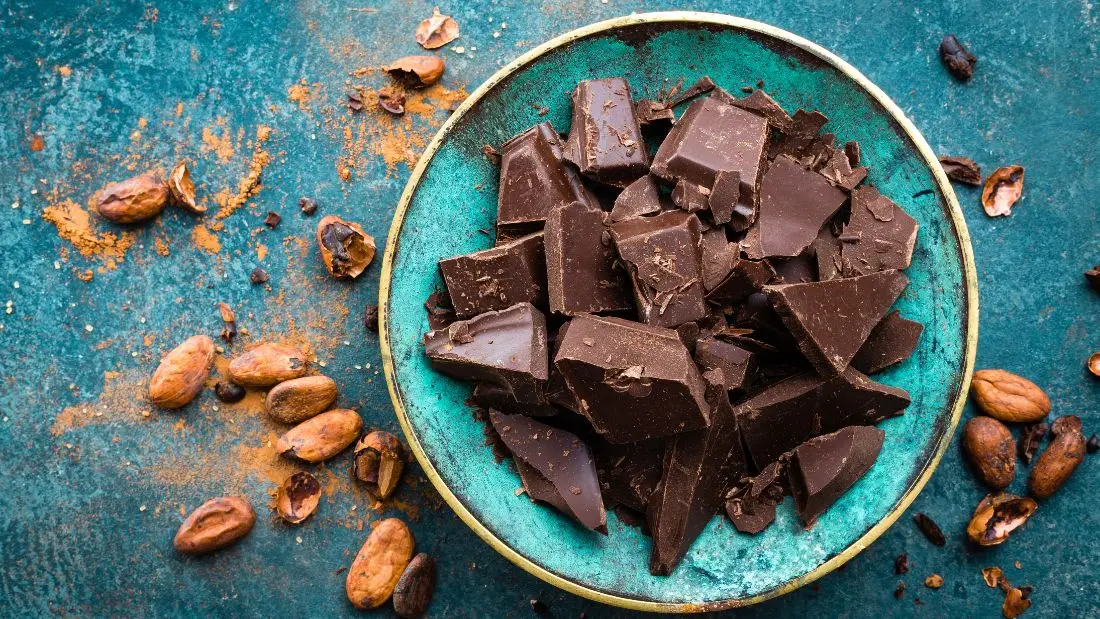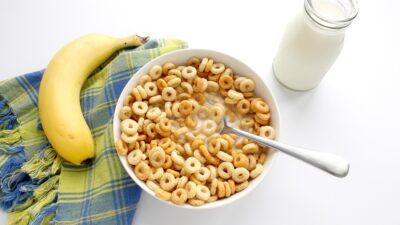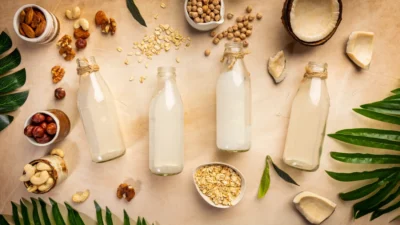10 processed foods that are actually good for you

We hear a lot these days about how bad ultra-processed foods are, and how we should all be eating more wholefoods. And for good reason! But sometimes, the word ‘processed’ gets a bad rap, and we end up throwing out the good with the bad. In fact, some processed plant-based foods are actually health powerhouses that deserve a place on your plate. Here are 10 that are actually good for your health and can be included in a healthy diet:
1. Tofu and tempeh
Tofu and tempeh are both processed from soya beans – tofu is produced from soya bean curd whereas tempeh is made from cooked and fermented soya beans. Soya is an extremely healthy food regardless of whether the soya is in the form of tofu, tempeh, soya yoghurt or soya milk. Soya is good for your bones, may reduce breast cancer risk and recurrence and can reduce cholesterol and the risk of heart disease. It is also an excellent source of protein. Tempeh has the additional benefit of being fermented which is great for your gut health. It’s time to show some appreciation for soya!
2. Mock meats (eg seitan, TVP and mycoprotein)
Mock meats are not lab-grown meat rather meat substitutes made from plant-based ingredients. For example, seitan is made from wheat gluten, TVP is textured vegetable protein, and mycoprotein – as found in Quorn products – is made from fungi. A 2024 study by the University of Exeter found that when meat was swapped with mycoprotein-containing Quorn products, the participants’ cholesterol dropped by 10 per cent and their blood-glucose levels were reduced. Mock meats also tend to be a great source of protein and are extremely versatile for cooking, providing a nice alternative to tofu from time to time.
3. Extra virgin olive oil
Olive oil is made by extracting the oil from the flesh of ripe olives and although extra virgin olive oil (EVOO) is minimally processed – no heat or chemicals are used – it’s still considered a processed food. Despite this, we would all be wise to consume some EVOO on a daily basis. A 2022 study found that those who consumed over half a tablespoon (or over seven grams) of olive oil a day had a 19 per cent lower risk of dying from cardiovascular disease, a 17 per cent lower risk of cancer mortality, a 29 per cent lower risk of neurodegenerative disease mortality and an 18 per cent lower risk of respiratory disease mortality. The researchers concluded that “replacing margarine, butter, mayonnaise, and dairy fat with olive oil was associated with lower risk of mortality.”
4. Fortified breakfast cereals
Let’s be clear: sugar-laden breakfast cereals like Coco Pops and Frosties are not good for your health but not all cereals are created equal and some are much better than others. Fortified cereals can be especially useful if you can’t access fresh foods as they can provide important vitamins and minerals that could be otherwise lacking from the diet. A 2016 study found that girls who ate a fortified breakfast cereal for 12 weeks showed “a significant improvement in micronutrient intake and micronutrient status.” In addition, a 2014 systematic review found many benefits of eating breakfast cereal, including lowered cholesterol, improved bowel function and a lower risk of diabetes and cardiovascular disease. This was supported by a 2025 study that recommended “moderate intake of several breakfast cereal types, including porridge, bran cereal, and muesli.” The key is to go for wholegrain, high-fibre, fortified cereals without added sugar and other unhealthy ingredients, and enjoy with a nice splash of chilled soya or almond milk.
5. Dark chocolate
It is often assumed that chocolate is the epitome of unhealthy food and while that can be the case for ultra-sweet dairy milk chocolate, it’s not true of good quality (around 85 per cent cocoa content) dark chocolate. Two 2024 studies found that eating dark chocolate – but not milk chocolate – was linked to a lower risk of type 2 diabetes and lower risk of hypertension. The former study also noted that unlike milk chocolate, dark chocolate consumption did not lead to weight gain. Dark chocolate can also improve our mood by beneficially affecting the gut-brain axis and is a rich source of antioxidants. Don’t let the bitterness of dark chocolate deter you! By slowly introducing it over a couple of weeks, you’ll train your taste buds to appreciate its deep, complex richness.
6. Popcorn
Despite its tendency to be disguised as a junky cinema treat, drizzled in sticky syrup or doused in unhealthy butter and salt, popcorn has the potential to be a very healthy snack. Popcorn is made from a specific type of corn – or maize – called Zea mays everta and is bursting with the benefits of wholegrain foods. These high-fibre foods have been linked to lower risks of type 2 diabetes, cardiovascular disease, and colorectal, pancreatic and gastric cancers. Eating fibre-rich foods has also been shown to help weight management. Forget sweet or salted; enjoy popcorn with a sprinkling of nutritional yeast or cinnamon for a much healthier snack.
7. Dried fruit
You may have heard that eating dried fruit is just as bad for you as eating a bag of jelly babies but although dried fruit may be just as sweet and delicious, it is packed with all the goodness of fresh fruit. A 2020 systematic review found that raisins, prunes and dates were associated with a significant reduction of “precancerous colorectal polyps, incidence of prostate cancer, or mortality from pancreatic cancer.” A 2025 study found that those who added dried fruit to their breakfast cereal had a significantly reduced risk of death from all causes, including cancer and cardiovascular disease. The only downside of dried fruit is that it’s so delicious it’s easy to consume a lot of calories in one sitting and therefore gain weight, but studies are mixed in this area and those who consume dried fruit tend to have higher quality diets all-round. It’s time to stop dissing dried fruits and embrace their “unique combination of taste/aroma, essential nutrients, fibre, and phytochemicals.”
8. Rye bread
Most wholegrain breads confer the heart-healthy benefits of high-fibre foods but few rise above rye bread. Rye breads, such as pumpernickel, are extremely high in fibre and outperform wheat breads when it comes to having a beneficial effect on the gut microbiome, improving weight management, reducing inflammation and lowering cholesterol. Rye bread has also been shown to be more effective at managing blood-glucose after a meal than wheat. Rye’s positive effect on both insulin and glucose responses has been referred to as the “rye factor.” Bread gets a lot of bad press for being refined carbs but you’d be wise to get a little rye in your life.
9. Fortified dairy-free milks
One of the first questions to those who don’t drink cow’s milk is: where do you get your calcium? These days there are a lot of options. While the nutritional value of dairy-free milks varies across the supermarket shelf, they all have something to offer and many are fortified with calcium, vitamin D, vitamin B12 and iodine. Soya milk is super healthy for so many reasons including its protein content, almond milk is rich in vitamin E, and oat milk is a source of beta glucans, a type of soluble fibre with heart health benefits. It’s time to dive into the sea of dairy-free milks, just avoid sweetened ones and favour the fortified options.
10. Pea protein powder
Few things seem as unnatural or as processed as a protein powder but that doesn’t mean they’re all unhealthy. In fact, pea protein, derived from yellow split peas, has many health benefits. Pea protein is just as effective at building muscle (if you work out) as whey protein (from cow’s milk) and contains all nine essential amino acids. It is easily digestible and, unlike soya and whey, is unlikely to cause allergic reactions. It also has also been shown to lower blood pressure, help manage blood-glucose, have anti-inflammatory properties and a beneficial impact on gut bacteria, and may even protect against some cancers. Many studies, including this one and this one, now recognise the importance of swapping animal protein for plant protein for long-term health and a pea protein powder is a safe and effective way to supplement your protein intake.
From calcium-set tofu and gut-friendly tempeh to heart-protective extra virgin olive oil and fibre-rich rye bread, processing can preserve or even enhance the nutritional value of foods. Ultimately, a truly healthy approach involves mindful selection, recognising that convenience and processing can, in many cases, go hand-in-hand with substantial health gains.







